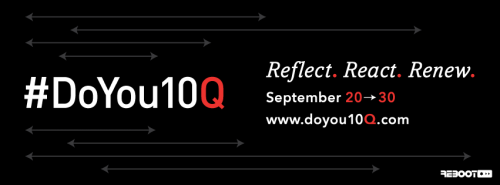Rosh Hashanah—the Jewish New Year—begins on Wednesday evening, Sept. 20. The holiday ushers in the 10 Days of Awe that fall between the New Year and the Day of Atonement. It can be a tense time, a time when the words of the traditional liturgy ring in one’s ears: “Who shall live and who shall die?” The proverbial Book of Life is open and God’s judgment can be severe. The founders of Reboot, a nonprofit dedicated to reinventing and reinvigorating Jewish tradition for the 21st century, want to transform the way we approach these days with a project called 10Q, which asks users 10 questions over 10 days.
Now in its 10th year, 10Q puts forth questions such as: Think about a major milestone that happened with your family this past year—how has this affected you? Or: Describe one thing you’d like achieve by this time next year—why is this important to you? Ben Greenman, a former editor at The New Yorker and a fiction writer, Nicola Behrman, a playwright and magician, and Amelia Klein, a historian, founded Reboot in 2007.
Each of them brings their talents to the group’s annual summit in which they invite 30 people to brainstorm about implementing Jewish-themed programs. At one of these summits, Behrman and her colleagues discussed the concept of leaving an ethical will—that is, leaving family stories and articulating values—for future generations.
10Q was born out of the idea of leaving a piece of oneself for posterity. The concept is simple: answer the same questions annually between Rosh Hashanah and Yom Kippur that evoke the themes of the season. The most facile way to bring together a large number of people to participate in 10Q was to make it an online venture. Signing up is easy on 10Q’s dedicated website. This year the first question will arrive in inboxes on Sept. 20, and a question a day will be sent through Yom Kippur. All answers are confidential and stored in a private online vault that is unlocked the next year.

According to Tanya Schevitz, Reboot’s director of communications, the questions have been “absolutely impactful on people. People have gotten divorced after answering the 10Q questions. Others have gotten married or decided to have a baby. For others, it’s been a motivational tool.”
I can attest to the motivational aspect of 10Q. Answering the now-familiar questions annually for five years has been integral to my High Holiday observance. 10Q is a verb for me, as in, “I 10Q ever year.” For four years, I gave the same answer to the question of what I wanted to achieve in the next year. My answer was always the same: to finish my book. After last year, I couldn’t bear the thought of seeing the same goal go unfulfilled. I committed to finishing a memoir that I had been working on for almost a decade. This year I’ll be able to say that completing my book was a significant experience that has happened to me in the past year.
Schevitz, who is based in San Francisco, notes that 10Q has proven so popular that she and her colleagues in New York and Los Angeles have brought it in real time to synagogues, Hillels and youth groups. The 10Q concept has just been introduced to young adults at Temple Israel of Boston. But Schevitz has also signed people up for 10Q at flea markets and farmers markets around the Bay Area. “10Q is rooted in Jewish tradition, but it also speaks to a broad spectrum of people,” says Shevitz.
In various pop-up booths that Schevitz calls “reflection tents,” there are also renewal cards available that ask people to write notes to themselves that Reboot will send back to them in six months. These cards have prompts that include: “In the next year I’ll learn…I’ll explore…I’ll stand for…I’ll complete….” Filling in the blank marks a gentle commitment to take forward action in one’s life.
Reboot also sponsors ongoing programs, such as a National Day of Unplugging, Death Over Dinner, Beyond Bubbie, Six-Word Memoirs on Jewish Life and reBar. The first of these is based on Shabbat observance. Everyone needs a day to disengage from harried, daily routines. Death Over Dinner encourages attendees to talk about end-of-life issues. Schevitz says rabbis and others are brought into the dinner conversations to train a Jewish lens on issues related to death.
The Six-Word Memoirs on Jewish Life project is produced in conjunction with Larry Smith, founder of the original endeavor. Reboot has suggested that people create six-word memoirs based on the various holidays or their Jewish journey. Beyond Bubbie showcases memories of family recipes and dinners. Schevitz notes there is a narrative component that gets to the story behind a particular recipe. And reBar is an exercise in rethinking one’s bar or bat mitzvah experience from an adult perspective. “In some ways, it’s a do-over,” says Schevitz.
At the end of 10Q there’s a bonus question: “What are your predictions for the coming year?” For a superstitious Sephardic Jew like me, that is a tough one to parse. Life is unpredictable, fragile. I can only hope for good health, high productivity and satisfying creativity. And I wish you the same as you also add 10Q as a verb to your vocabulary on Sept. 20.



